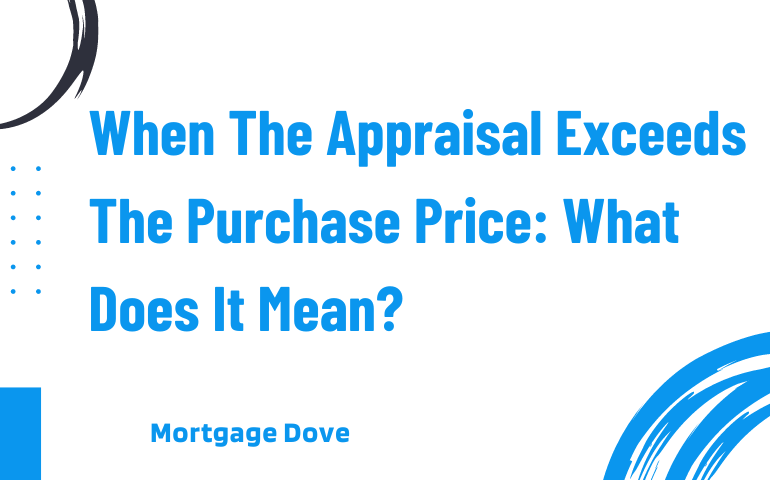
Mortgage Dove
When The Appraisal Exceeds The Purchase Price: What Does It Mean?
Have you ever heard of a situation where the appraisal of a property comes in higher than the agreed-upon purchase price? It might seem unusual, but it happens and can have various implications for buyers and sellers in the real estate market. Although, sometimes, the opposite can occur where the purchase price is higher than the appraisal, creating what's known as an "appraisal gap. Here’s a breakdown of what it means when an appraisal value surpasses the purchase price and how it can affect different parties involved. A home appraisal determines how much your property is worth by looking at where it is, its condition, and the prices of similar nearby homes recently sold. It tells you the value of your property and the maximum amount a lender might loan you for it. A person called an appraiser figures out how much a home is worth. They're licensed and help the buyer and lender know the home's value. An appraiser checks out a few things when checking out a house. When you compare an appraisal with a home assessment, an appraisal considers where your house is located and similar sales nearby. It also checks out how well the house is built and any cool stuff it might have. The appraiser also considers the property size and significant changes like added rooms or renovations. An appraiser checks: Outside: Inside: The person checking the property will judge if it's in "good," "average," "fair," or "poor" condition after checking it out. After that, they'll use software to compare it with other nearby homes that were sold in the last 6 months. These are similar in size and price to see how they stack up. An appraisal doesn't have a set time. It might take longer in rural places because there are few appraisers around. Sometimes, getting one out to check a property could even take months. When they're there, appraisers usually spend a few hours, but it can change based on how big or messed up the place is. Bigger or rundown properties take more time to appraise. Sometimes, the home appraisal matches or goes a bit lower than the agreed purchase price. But when the appraisal value ends up higher than what was agreed to pay, it can affect different people in various ways: For Buyers: If the property's appraisal value exceeds what you're paying, you instantly get more value. This could give you extra financial power, allowing for a smaller down payment, depending on your mortgage terms. Some lenders offer better loan terms when the property's value exceeds what you're paying. This could mean lower interest rates or less private mortgage insurance (PMI) for you as the buyer. Buyers might reconsider their options when the property's value exceeds the purchase price. You could stick with the initial price, renegotiate for a lower one, or feel good about having more equity and go ahead with the purchase. For Sellers: Sellers can reap advantages from an appraisal that's higher than anticipated. It means their property holds a higher value in the market, potentially attracting more interested buyers, especially in competitive markets. When a buyer relies on a loan to buy the property and the appraisal exceeds expectations, it could streamline the closing process. However, during negotiations, it might also prompt buyers to seek a lower purchase price. Based on the terms in the purchase agreement, sellers may need to align the selling price with the appraised value, rework the terms, or face the risk of the deal falling apart if the buyer struggles to secure financing. This can significantly impact the outcome. When the appraised value of a home exceeds its purchase price, both buyers and sellers need to collaborate closely with their real estate agents and lenders for a successful outcome: Discussion and Negotiation Buyers and sellers can discuss and negotiate to reach a solution that benefits both parties. This may involve reconsidering the purchase price, adjusting contract terms, or finding a middle ground that satisfies everyone involved. Consider Reappraisal Buyers can request a new appraisal if they suspect inaccuracies or believe the initial appraisal doesn’t accurately reflect the true value of the property. Proceeding with Care While a higher appraisal might appear advantageous, buyers should assess whether paying more aligns with their financial objectives. Similarly, sellers must carefully evaluate the potential implications before making any final decisions, ensuring that the outcome meets their expectations and plans. No. If the house you're buying gets valued higher than the agreed purchase price, you might wonder if that extra value can help with your down payment. However, it's important to note that even if the appraisal shows a higher value, it typically doesn't affect the loan amount you can secure or reduce the down payment required for your mortgage. In most cases, you'll still need to follow the initial agreement on the down payment regardless of the appraisal results. An appraisal coming in higher than the purchase price can lead to various outcomes depending on who's involved and how they talk it out. Both buyers and sellers need to think about what they can do, talk well, and think about what might happen before they decide for sure. Doing this helps things go smoothly when dealing with real estate matters.What’s an Appraisal?
What Does an Appraiser Do?
How Much Time Does It Take for an Appraisal?
When Appraisal Exceeds Purchase Price
What to Do When the Appraisal is Higher
Does a Higher Appraisal Value on the House I'm Purchasing Allow Me to Use the Extra Equity for My Down Payment?
The Bottom Line
"Mortgage Dove makes home financing convenient for every American. You can count on us to provide a home buying experience tailored to your personal needs and financial situation. We strive to give you the peace of mind that your home financing goals can be achieved.”

Mortgage®
www.mortgagedove.com



-and-how-does-it-work.png)